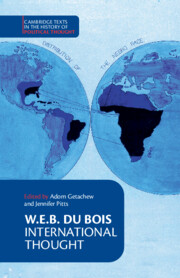Book contents
- W.E.B. Du Bois: International Thought
- Cambridge Texts In The History Of Political Thought
- W.E.B. Du Bois: International Thought
- Copyright page
- Contents
- Figures
- Acknowledgments
- Note on the Text
- Democracy and Empire
- Select Chronology of William Edward Burghardt Du Bois
- Book part
- 1 The Present Outlook for the Dark Races of Mankind (1900)
- 2 To the Nations of the World (1900)
- 3 The African Roots of War (1915)
- 4 Of the Culture of White Folk (1917)
- 5 Letter from W. E. B. Du Bois to President Woodrow Wilson (1918)
- 6 To the World (Manifesto of the Second Pan-African Congress) (1921)
- 7 Worlds of Color (1925)
- 8 Liberia and Rubber (1925)
- 9 Liberia, the League and the United States (1933)
- 10 Where Do We Go from Here?
- 11 Inter-Racial Implications of the Ethiopian Crisis: A Negro View (1935)
- 12 The Clash of Colour: Indians and American Negroes (1936)
- 13 The Union of Colour (1936)
- 14 What Japan Has Done (1937)
- 15 Black Africa Tomorrow (1938)
- 16 The Realities in Africa: European Profit or Negro Development? (1943)
- 17 Prospect of a World without Race Conflict (1944)
- 18 Colonies and Moral Responsibility (1946)
- 19 A Cup of Cocoa and Chocolate Drops (1946)
- 20 An Appeal to the World: A Statement of Denial of Human Rights to Minorities
- 21 Colonies as Cause of War: Address to the World Peace Congress, Paris (1949)
- 22 On the West Indies: Address of Dr. W. E. B. Du Bois at the St. Thomas Chamber of Commerce (1952)
- 23 To the World Peace Council, Budapest (1953)
- 24 Colonialism and the Russian Revolution (1956)
- Index
12 - The Clash of Colour: Indians and American Negroes (1936)
Published online by Cambridge University Press: 10 November 2022
- W.E.B. Du Bois: International Thought
- Cambridge Texts In The History Of Political Thought
- W.E.B. Du Bois: International Thought
- Copyright page
- Contents
- Figures
- Acknowledgments
- Note on the Text
- Democracy and Empire
- Select Chronology of William Edward Burghardt Du Bois
- Book part
- 1 The Present Outlook for the Dark Races of Mankind (1900)
- 2 To the Nations of the World (1900)
- 3 The African Roots of War (1915)
- 4 Of the Culture of White Folk (1917)
- 5 Letter from W. E. B. Du Bois to President Woodrow Wilson (1918)
- 6 To the World (Manifesto of the Second Pan-African Congress) (1921)
- 7 Worlds of Color (1925)
- 8 Liberia and Rubber (1925)
- 9 Liberia, the League and the United States (1933)
- 10 Where Do We Go from Here?
- 11 Inter-Racial Implications of the Ethiopian Crisis: A Negro View (1935)
- 12 The Clash of Colour: Indians and American Negroes (1936)
- 13 The Union of Colour (1936)
- 14 What Japan Has Done (1937)
- 15 Black Africa Tomorrow (1938)
- 16 The Realities in Africa: European Profit or Negro Development? (1943)
- 17 Prospect of a World without Race Conflict (1944)
- 18 Colonies and Moral Responsibility (1946)
- 19 A Cup of Cocoa and Chocolate Drops (1946)
- 20 An Appeal to the World: A Statement of Denial of Human Rights to Minorities
- 21 Colonies as Cause of War: Address to the World Peace Congress, Paris (1949)
- 22 On the West Indies: Address of Dr. W. E. B. Du Bois at the St. Thomas Chamber of Commerce (1952)
- 23 To the World Peace Council, Budapest (1953)
- 24 Colonialism and the Russian Revolution (1956)
- Index
Summary
This 1936 essay laments the lack of knowledge that African Americans and Indians have of one another, attributing the situation to poor journalistic standards and propaganda, which encourage false, frivolous, and sensationalist stories and suppress news of freedom struggles on both sides. Religious differences also hinder understanding. It calls for Indians and African Americans to understand their respective anti-imperialist and anti-racist struggles as facets of the same “world-wide clash of colour,” to stand together against exploitation by white races, and to commit to new and emancipatory forms of economic activity so that exploitation by whites is not replaced by that “of coloured races by coloured men.”
- Type
- Chapter
- Information
- W. E. B. Du Bois: International Thought , pp. 144 - 149Publisher: Cambridge University PressPrint publication year: 2022

